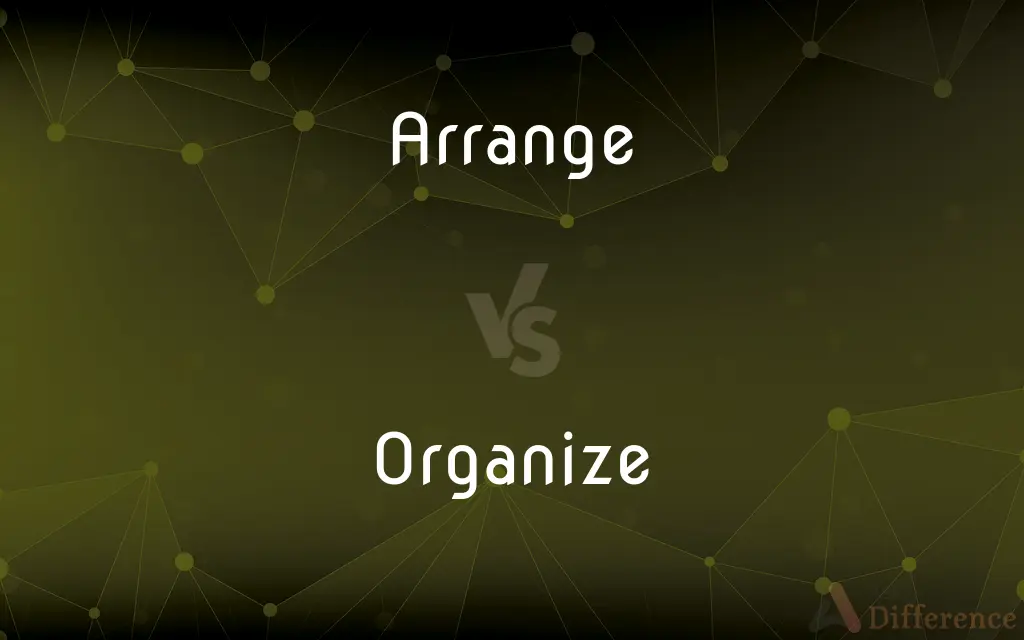Arrange vs. Organize — What's the Difference?
By Tayyaba Rehman & Urooj Arif — Updated on March 27, 2024
Arrange focuses on setting items in a specific order or layout, often for a particular purpose, while organize involves creating a structured and orderly system, possibly categorizing items or tasks for efficiency.

Difference Between Arrange and Organize
Table of Contents
ADVERTISEMENT
Key Differences
To arrange is to place items in a particular order or layout, often with an aesthetic or practical purpose in mind. This can involve setting up furniture in a room to maximize space and comfort, or sequencing events in a program to ensure a smooth flow. Organize, on the other hand, encompasses a broader process of creating structure and order, which may include categorizing, systematizing, and planning to enhance efficiency and accessibility.
Arrangement often concerns itself with the physical or visual layout of objects, focusing on how they are positioned relative to one another. For instance, arranging books on a shelf by height or color for visual appeal. In contrast, to organize might mean categorizing those same books by genre, then alphabetically by author, to make finding a specific book easier.
When you arrange a meeting, you're focusing on setting a specific time, date, and place, considering the convenience and availability of the participants. Organizing a meeting, however, involves not only setting these parameters but also planning the agenda, distributing roles, and ensuring all necessary materials are prepared and accessible.
Arrangement can be a one-time task, such as arranging chairs for an event, which does not necessarily require ongoing management after the initial setup. Organizing, however, implies a level of continuous management and adjustment, like organizing a team’s workflow, which involves monitoring progress and making adjustments as needed.
In some contexts, the terms can be used interchangeably, especially in casual conversation. However, the distinction becomes clear in professional or systematic contexts where the depth of planning and structure is emphasized. Organizing a library, for example, involves a systematic approach to not only arranging books in a certain order but also implementing a cataloging system that facilitates access and management.
ADVERTISEMENT
Comparison Chart
Focus
Specific order or layout
Structure and system
Purpose
Aesthetic, practical layout
Efficiency, accessibility
Scope
Often physical or visual
Broad, includes categorization, planning
Example Activities
Setting furniture, sequencing events
Categorizing items, planning agendas
Continuous Management
Not necessarily required
Often required for efficiency and order
Compare with Definitions
Arrange
To put in a specific order for aesthetic or practical purposes.
She arranged the flowers in a vase beautifully.
Organize
To create a structured and orderly system.
She organized the documents into clearly labeled folders.
Arrange
To make preparations or plans for an event.
They arranged a surprise party for her birthday.
Organize
To establish a cohesive and functional arrangement.
Organize the kitchen utensils by use for easy access.
Arrange
To sequence or schedule events.
He arranged his appointments to avoid conflicts.
Organize
To categorize items or tasks for better management.
Organize your tasks by priority to manage your time effectively.
Arrange
To set up with attention to detail and order.
They arranged the chairs in a circle for the meeting.
Organize
To coordinate activities or people for a common goal.
They organized volunteers to help clean up the park.
Arrange
To position objects in relation to each other.
Arrange the paintings to create a balanced gallery wall.
Organize
To plan and execute with efficiency.
He organized the conference with a detailed schedule and session descriptions.
Arrange
(Music) To adapt or rework (a composition) for other instruments or voices or as another style of performance.
Organize
Arrange systematically; order
Organize lessons in a planned way
Arrange
Arrange is a mythological figure from the Australian aboriginal creation myth of the Alyawarre people for Karlu Karlu. In the myth, the figure Arrange, who is also referred to as the devil man, comes from Ayleparrarntenhe.
Organize
Make arrangements or preparations for (an event or activity)
Social programmes are organized by the school
Arrange
To put into a specific order or relation; dispose
Arrange shoes in a neat row.
Organize
To put in order; arrange in an orderly way
Organized the papers into files.
Organized her thoughts before speaking.
Arrange
To plan or prepare for
Arrange a picnic.
Organize
To cause to have an orderly, functional, or coherent structure
Organized the report around three main initiatives.
Arrange
To bring about or come to an agreement concerning; settle
Have the bride and groom arranged the date of the wedding?.
Organize
To cause (oneself) to act or live in an orderly or planned way
Has trouble in school because he can't get organized.
Arrange
To come to an agreement
Arrange with a friend for a ride to work.
Organize
To arrange or prepared for (an activity or event)
Organize a party.
Organize a strike.
Arrange
To cause something to happen or make plans for something to happen
Arrange for a big wedding.
Organize
To establish as an organization
Organize a club.
Arrange
(transitive) To set up; to organize; to put into an orderly sequence or arrangement.
Organize
To induce (employees) to form or join a labor union.
Arrange
To plan; to prepare in advance.
To arrange to meet; to arrange for supper
Organize
To induce the employees of (a business or industry) to form or join a union
Organize a factory.
Arrange
To prepare and adapt an already-written composition for presentation in other than its original form.
Organize
To develop into or assume an orderly, functional, or coherent structure.
Arrange
Rearranged rendition of a song; arrangement
Organize
To form or join an activist group, especially a labor union.
Arrange
To put in proper order; to dispose (persons, or parts) in the manner intended, or best suited for the purpose; as, troops arranged for battle.
So [they] came to the market place, and there he arranged his men in the streets.
[They] were beginning to arrange their hampers.
A mechanism previously arranged.
Organize
(transitive) To arrange in working order.
Arrange
To adjust or settle; to prepare; to determine; as, to arrange the preliminaries of an undertaking.
Organize
(transitive) To constitute in parts, each having a special function, act, office, or relation; to systematize.
Arrange
Put into a proper or systematic order;
Arrange the books on the shelves in chronological order
Organize
To furnish with organs; to give an organic structure to; to endow with capacity for the functions of life
An organized being
Organized matter
Arrange
Make arrangements for;
Can you arrange a meeting with the President?
Organize
To sing in parts.
To organize an anthem
Arrange
Plan, organize, and carry out (an event)
Organize
To band together into a group or union that can bargain and act collectively; to unionize.
The workers decided to organize; their next task was to organize the workers at the steel mill
Arrange
Set (printed matter) into a specific format;
Format this letter so it can be printed out
Organize
To furnish with organs; to give an organic structure to; to endow with capacity for the functions of life; as, an organized being; organized matter; - in this sense used chiefly in the past participle.
These nobler faculties of the mind, matter organized could never produce.
Arrange
Arrange attractively;
Dress my hair for the wedding
Organize
To arrange or constitute in parts, each having a special function, act, office, or relation; to systematize; to get into working order; - applied to products of the human intellect, or to human institutions and undertakings, as a science, a government, an army, a war, etc.
This original and supreme will organizes the government.
Arrange
Adapt for performance in a different way;
Set this poem to music
Organize
To sing in parts; as, to organize an anthem.
Arrange
Arrange thoughts, ideas, temporal events, etc.;
Arrange my schedule
Set up one's life
I put these memories with those of bygone times
Organize
Create (as an entity);
Social groups form everywhere
They formed a company
Organize
Cause to be structured or ordered or operating according to some principle or idea
Organize
Plan and direct (a complex undertaking);
He masterminded the robbery
Organize
Bring order and organization to;
Can you help me organize my files?
Organize
Arrange by systematic planning and united effort;
Machinate a plot
Organize a strike
Devise a plan to take over the director's office
Organize
Form or join a union;
The autoworkers decided to unionize
Common Curiosities
Why is it important to organize?
Organizing is important for enhancing efficiency, reducing clutter, improving accessibility, and making better use of time and resources.
What does it mean to arrange something?
To arrange means to put items in a specific order or layout for a particular purpose, focusing on aesthetic or practical considerations.
Can you organize without arranging?
While organizing includes elements of arranging, it's broader and focuses on systemic order and efficiency, so in practice, organizing often involves arranging as a component.
How is organizing different from arranging?
Organizing involves creating a structured system, including categorizing and planning for efficiency, whereas arranging focuses on the order or layout of items.
How does one decide between arranging and organizing?
The decision depends on the goal: if the aim is for things to look good or follow a specific sequence, you arrange; if the goal is systemic efficiency and accessibility, you organize.
Can organizing affect productivity?
Yes, effective organization can significantly increase productivity by streamlining processes and reducing time spent searching for items or information.
Is arranging a skill?
Yes, arranging is a skill that involves a sense of aesthetics, spatial awareness, and the ability to create order and harmony among objects.
How do professionals approach organizing?
Professionals approach organizing systematically, assessing needs, categorizing items, implementing structures, and planning for ongoing management.
What's a simple start to organizing?
A simple start to organizing is to categorize items by their purpose or frequency of use and designate specific places for them.
How do organizing habits impact daily life?
Organizing habits can make daily life more streamlined, reduce stress, and free up time for more important or enjoyable activities.
Is arranging more about aesthetics?
Arranging often emphasizes aesthetics and practical layout, focusing on how things look and function in their placement.
Can arranging be temporary?
Yes, arranging can be temporary, like setting up for an event, whereas organizing tends to have a more long-term focus.
Does arranging involve planning?
Arranging involves planning in terms of order, layout, and timing, especially when sequencing events or setting up spaces.
How does technology aid in organizing?
Technology aids in organizing through tools for task management, scheduling, digital filing, and automating repetitive tasks for better efficiency.
What's the difference in organizing physical vs. digital spaces?
Organizing physical spaces involves tangible items and spatial considerations, while digital spaces focus on file management, categorization, and virtual space efficiency.
Share Your Discovery

Previous Comparison
Brethren vs. Sistren
Next Comparison
Sauna vs. SpaAuthor Spotlight
Written by
Tayyaba RehmanTayyaba Rehman is a distinguished writer, currently serving as a primary contributor to askdifference.com. As a researcher in semantics and etymology, Tayyaba's passion for the complexity of languages and their distinctions has found a perfect home on the platform. Tayyaba delves into the intricacies of language, distinguishing between commonly confused words and phrases, thereby providing clarity for readers worldwide.
Co-written by
Urooj ArifUrooj is a skilled content writer at Ask Difference, known for her exceptional ability to simplify complex topics into engaging and informative content. With a passion for research and a flair for clear, concise writing, she consistently delivers articles that resonate with our diverse audience.














































